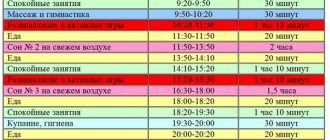Content:
- Causes of the anomaly
- What does a “shark” smile lead to?
- When to see a doctor
- When to hesitate to see a doctor
- How is the treatment carried out?
The situation when a molar has erupted, but the milk tooth is in no hurry to leave its place, dentists call a “shark” bite. This is due to the fact that sharks also have units arranged in two rows. In humans, such an anomaly does not look aesthetically pleasing at all. Parents usually get very scared when they see a “double” smile on their child. Should I be concerned if a tooth comes out but the baby tooth does not fall out, and what could this lead to? Let's figure it out together.
When do molars erupt?
Molars are the last teeth that erupt in the child’s lower and upper dentition. As a rule, the first units appear on the lower jaw at the age of 12-18 months, a month later molars erupt on the upper row. The second molars appear in a child between 24 and 30 months of age.
Replacement of primary molars of the lower jaw occurs at the age of 6-8 years. In place of the upper units, molars grow only by the age of 9-12 years. However, these are average indicators and may vary depending on individual characteristics.
The timing of eruption depends on the following factors :
- hereditary predisposition;
- the general health of the child;
- congenital features;
- climatic living conditions;
- nature of nutrition;
- gender of the child.
Causes of the anomaly
If the permanent tooth is erupting but the baby tooth has not fallen out, it can be assumed that the child is not eating enough solid food. With a deficiency of chewing load, the roots of temporary units are in no hurry to dissolve.
The diet of modern children is indeed too “gentle”, one might even say refined. It consists of products that have undergone step-by-step heat treatment. Chewing them requires almost no effort.
If parents think that children need to be given soft and thoroughly steamed food, then they are mistaken. To change teeth in a timely manner and form a correct bite, you need to eat a lot of fresh vegetables and fruits, and other foods that require careful chewing. Then the problem of preserving primary canines, incisors and molars for too long will not arise.
Another possible cause of the problem described is the presence of scars on the gums. If in the first years of life the baby has undergone dental surgery or received a serious injury, a burn to the oral cavity, scars may form on his gums. They consist of very dense connective tissue that prevents teeth from erupting.
The order of eruption of baby teeth in children - table
| Age in months | What appears |
| 6-9 | central upper and lower incisors |
| 8-13 | "twos" above and below |
| 12-15 | first molars |
| 18-20 | fangs |
| 19-30 | second molars |
All terms are conditional. This means that if minor deviations occur in the first year of life, you should not panic and invent non-existent diseases. It is better to show the baby to a pediatric dentist. An experienced doctor will be able to discern a possible pathology and, if necessary, refer you for an X-ray examination.
What does a “shark” smile lead to?
Should you be scared if a new unit comes out, but the milk unit does not fall out? This situation should alert parents. Double dentition can lead to problems with articulation and diction. Then the child will have difficulties with the correct pronunciation of sounds and words.
Also, many patients with the described anomaly have difficulty eating food - they feel uncomfortable biting off hard foods, and when chewing them, small particles often get lodged under the gum. This means that the child will get used to swallowing poorly chewed food. This leads to disturbances in the functioning of the gastrointestinal tract, including flatulence and abdominal pain.
It happens that children who have double units in several places at once begin to lose weight. This is again due to improper chewing of food. During a meal, they swallow large pieces and because of this they swallow a lot of air. Therefore, they often have the illusion of satiety - a feeling of fullness when very little has been eaten.
Among the dental complications caused by untimely change of units:
- caries;
- inflammation of the gums;
- deposition of a large amount of soft plaque.
Therefore, you should not put off visiting the dentist. The doctor will conduct an examination and decide whether to remove the extra unit.
The body's reaction to the first teeth
At this time, the child often cries, gets upset for no reason, and refuses to eat because he experiences severe discomfort. Parents need to be patient and support the baby during this difficult time.
Increased salivation
The salivary glands begin to function more actively. The gums are preparing for the appearance of incisors, canines and molars, and additional moisture helps prevent the penetration of infectious agents. This symptom disappears at about 8-10 months, when the baby is already strong enough.
Also, when crowns break through, immunity decreases. And you need to be prepared for the fact that a baby who puts his hands and surrounding objects into his mouth will not be protected from pathogenic microorganisms.
Runny nose
How do baby teeth erupt (the order of eruption in infants does not matter) if immunity declines? Since the child’s body cannot fully resist viruses and bacteria, nasal congestion occurs. Snot is also observed due to excessive salivation. The secretion penetrates the middle ear and flows down the nasal passages.
Coughing
This sign is directly related to the one discussed above. The baby cannot swallow large amounts of liquid in time and is forced to cough and sneeze. When saliva accumulates in the nasopharynx, quiet wheezing is heard in the chest.
In the absence of an infectious process, cough is observed exclusively at night. This is due to the horizontal position of the baby and the inability of liquid contents to drain into the throat. A cough reflex occurs approximately every half hour.
If, along with this symptom, the body temperature rises and distinct wheezing is heard, you need to consult a doctor and undergo all the necessary diagnostic tests.
Diarrhea or constipation
Even if the order of teething in infants (children under one year old) is not disturbed, the gastrointestinal tract reacts sharply to any changes. Diarrhea can be triggered by excess saliva, sleep problems, and stress. The opposite condition, when the child does not walk, is much less common.
Parents should carefully monitor manifestations. An upset stomach may indicate poisoning or other pathological processes. Normally, the consistency of stool changes slightly, the symptom persists for no more than three days.
Vomiting, nausea
Rarely observed. They are provoked by excessive salivation and cough syndrome. If your baby vomits frequently, this is not normal. He may have been poisoned, so it is recommended to urgently call a local pediatrician or an ambulance.
Swelling of the gums
This can be checked by lightly pressing on the mucous membranes. Small tubercles on the gingival surface are visually identified and can be easily palpated.
Sometimes blood clots are observed at the elevation. This is due to the natural rupture of the vessel due to the piercing crown.
Swelling of the membranes causes itching and pain. When infected, ulcers appear, the same thing happens when accidentally injured by toys or sharp objects that fall into the oral cavity.
Decreased appetite
Regardless of the order of eruption and age, children's teeth almost always cause discomfort. Babies often become fussy while eating or refuse food completely. The formation of the chewing apparatus takes energy, and there is no energy left for chewing. When all the rows are thinned, the baby will begin to make up for the lack of nutrients. You cannot force him to eat.
Fever
Fever persists for up to 3 days. Temperatures can reach 38 degrees or more. Doctors associate this symptom with inflammation of the gums and the entry of infectious agents into wounds on the mucous membrane. When the dental unit comes out, everything returns to normal.
The thermometer rarely shows values of 39-40°. This is typical for weakened infants who regularly catch colds.
If your baby has a high fever for 4 days or more, it is important to see a doctor. Most likely, such symptoms have nothing to do with the appearance of incisors, canines and molars.
Skin rash
Rashes occur due to irritation of the skin on the face, neck, arms, and chest area. Saliva gets on soft tissues and corrodes them. The fingers become covered with pimples because the baby constantly pulls them into his mouth in order to scratch the inflamed mucous membranes.
Irritability, moodiness
Of course, the child is in pain, his gums are swollen and itchy. All this is felt quite acutely and affects mood and sleep. The condition improves immediately after the crown comes to the surface. The baby will want to eat again, smile and sleep soundly.
Desire to gnaw, bite
Even at a fairly conscious age (after one year), children, during the formation of the primary bite, try to put something into the oral cavity in order to scratch everything inside. What can we say about babies? When a baby chews on something hard, the unpleasant symptoms disappear for a while, and a temporary improvement in well-being is actually observed.
To do this, children use everything they can get their hands on. Adults are required to supervise them at such times. Otherwise, the baby may get injured and cause an infection in the wound.
When to see a doctor
Doctors believe that a “shark” smile can last up to two to three months, then it is necessary to take action. If the baby tooth does not fall out within the specified period, it needs to be removed. If you do not do this, the complications described above may occur.
But what’s even worse is that the child’s bite may be disrupted. The permanent unit will take the wrong position or be at the wrong angle. Then you will have to correct its position using plates or braces, and this is always difficult and time-consuming.
It is important to know! If a permanent tooth has come out, but the baby tooth has not yet fallen out, you can monitor the situation for several weeks. It is important to ensure that the child carefully maintains oral hygiene. If after two or three months nothing has changed, you need to make an appointment for your baby to see a dentist. But this recommendation is relevant only if the little patient is not bothered by anything and does not complain of toothache.
The appearance of a second row of teeth in the jaw
Each canine, incisor and molar has its own place, but sometimes a child's permanent teeth begin to form a second row. This often happens when the milky ones have not yet fallen out, but the radical ones have already begun to appear. An undeveloped jaw that provides too little room for growth can also be a source of the problem. The third reason is that the incisors and canines in the second row are “superfluous”, or supernumerary.
The second row of teeth is not only inconvenient, but also unsightly, so the problem needs to be solved. A baby tooth that does not fall out in time can be removed in the clinic. If the reason for the formation of the second row is underdevelopment of the jaw, then the dentist can remove several teeth and install braces on the remaining ones.
When to hesitate to see a doctor
If a “shark” problem appears and the child complains of pain, the gums are inflamed, swollen, you need to immediately get dental care. Also warning symptoms are:
- bad breath;
- bleeding of the affected gums;
- separation of pus in the area of inflammation;
- severe discomfort while chewing food.
You should not wait a day if the child has a predisposition to malocclusion, for example, if he has previously undergone treatment for malocclusion or one of the parents wore braces. In all these situations, removal should be carried out as soon as possible. This measure will be a good prevention of possible complications.
How is the treatment carried out?
When choosing treatment tactics, the dentist takes into account:
- how old is the patient;
- how long ago the permanent unit emerged;
- how much the molar crown appeared;
- what condition is the milk unit in;
- does the child have any complaints;
- general condition of the dentition;
- the patient has a predisposition to dental anomalies.
After conducting an in-person examination, the dentist decides whether to pull out the interfering tooth or leave it and wait until its roots resolve on their own. In the first case, local anesthesia is administered and removal is carried out; in the second, the doctor tells you when the baby needs to come for a second examination. Thus, if you deal with the problem of a “shark” smile in a timely manner, it will not cause negative consequences.
Possible problems with deviations from the norm
Complete edentia is a case when teeth are completely absent.
Regardless of the fact that the molars have just appeared or are about to erupt in the mouth of their beloved child, parents should be vigilant, because there are many dental problems. The main issue is the delay in the growth of permanent teeth (a baby tooth has fallen out, but a new one has not appeared).
The reason may lie in a genetic predisposition or edentia, which arose due to a violation of the formation of rudiments during intrauterine development. If there is no way to influence the situation, the child is indicated for prosthetics.
When permanent teeth erupt, another problem may arise – pain. This is most often due to thin, not fully formed enamel, which does not have sufficient mineralization. It is at this stage that the tooth is susceptible to various diseases, in particular caries.
With deep destruction of dental tissues, even more serious diseases develop: pulpitis, periodontitis. Therefore, you cannot ignore a child’s toothache; you need to make an appointment with a pediatric dentist as soon as possible.
At the very beginning of the growth of permanent teeth, other problems can occur:
- loss of a root unit is a signal of serious problems with the child’s health;
- an increase in the level of trauma - the active lifestyle of children during the period of maturation of molars often leads to injury to the incisors and canines, and attempts to chew hard objects end in the breakage of molars and premolars.
Each case requires the intervention of a specialist to eliminate the negative consequences.










